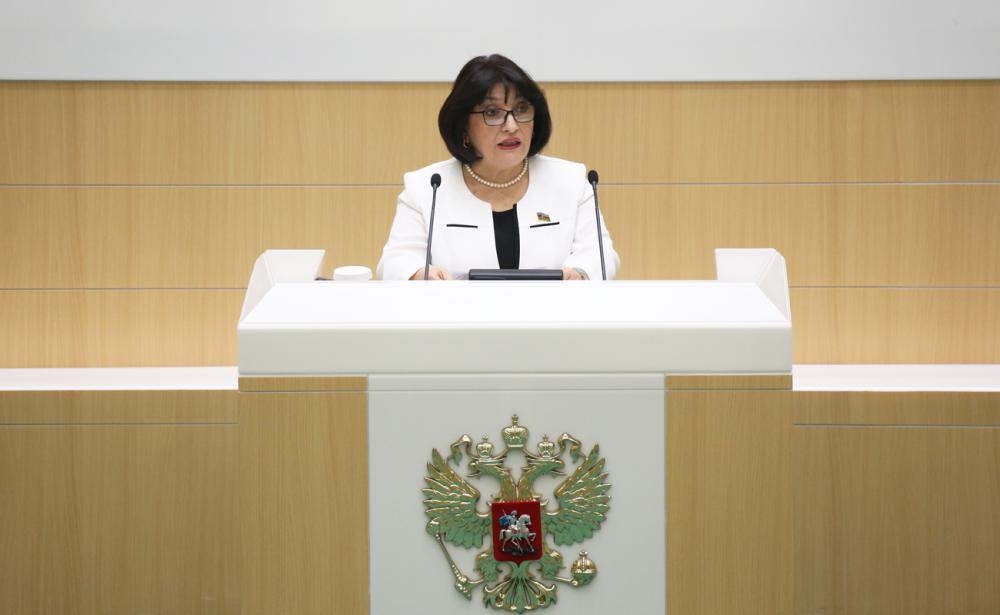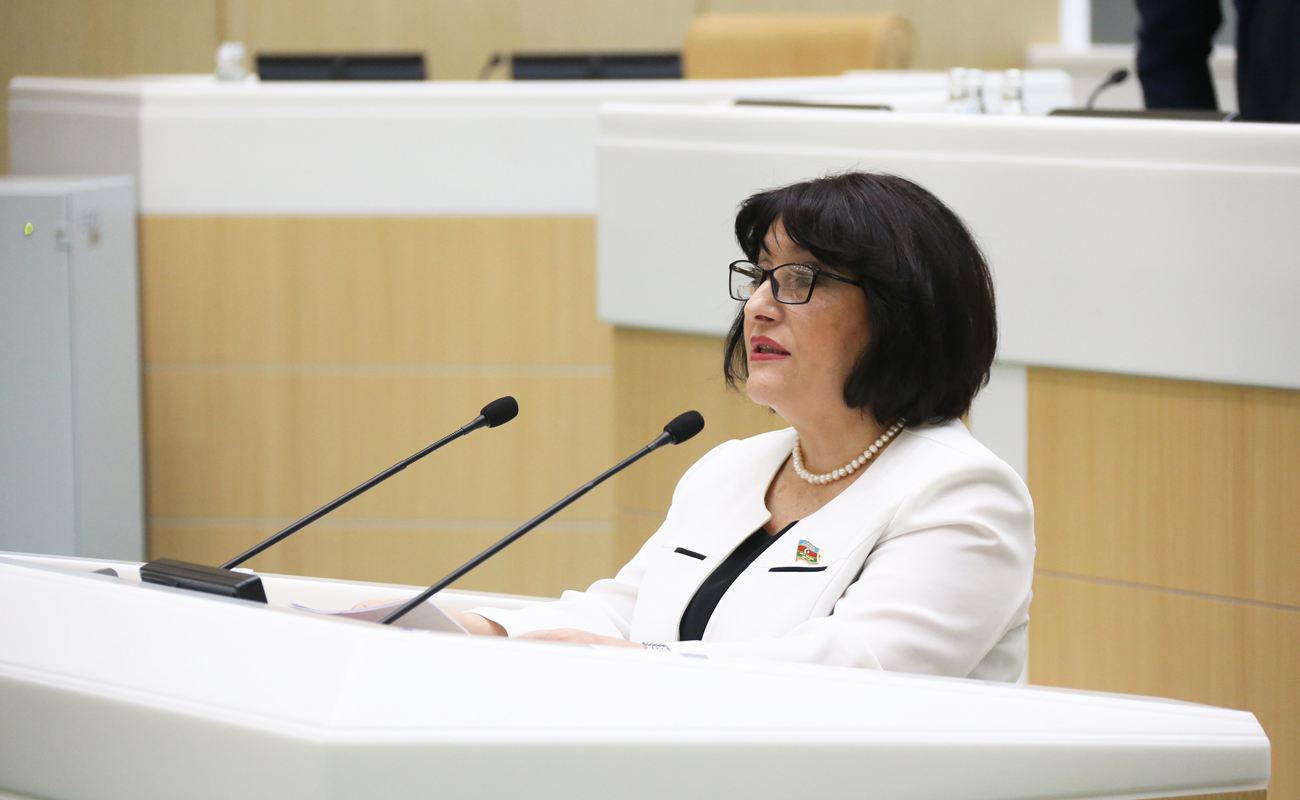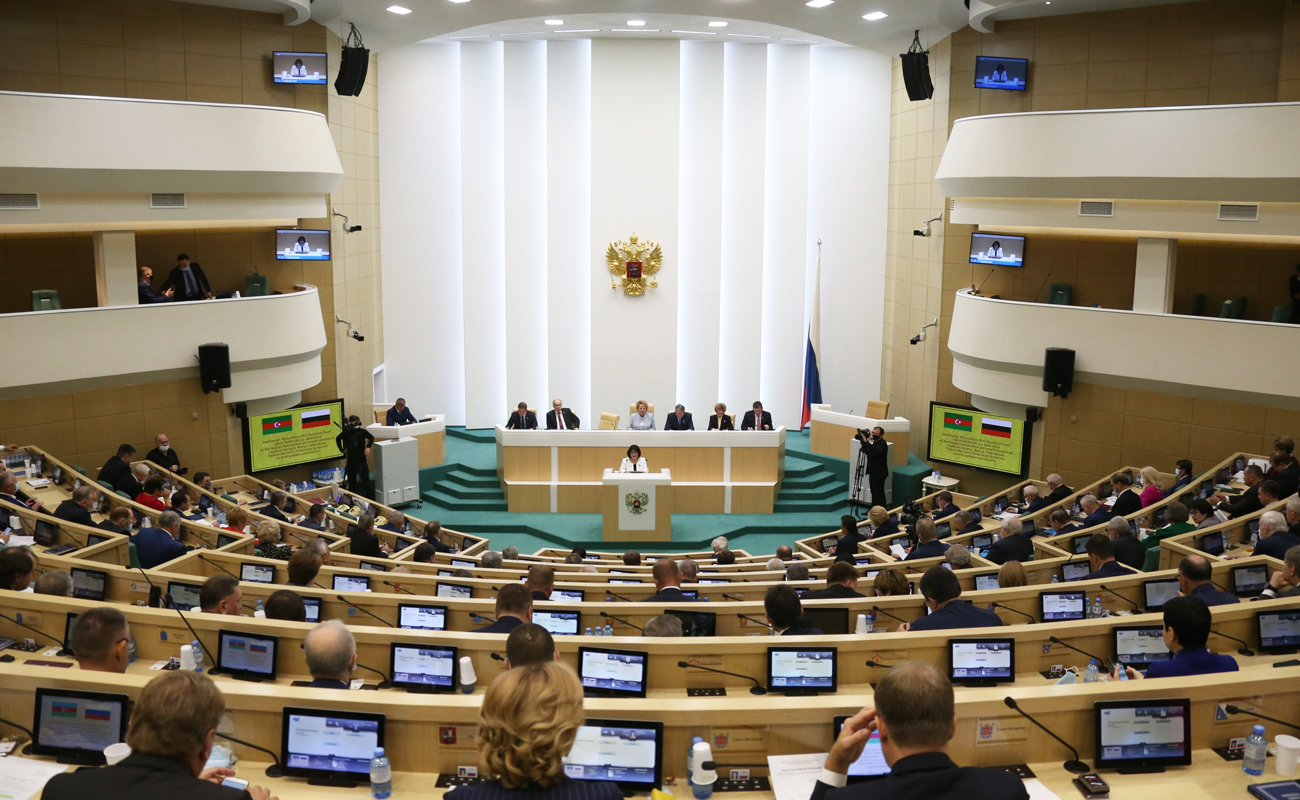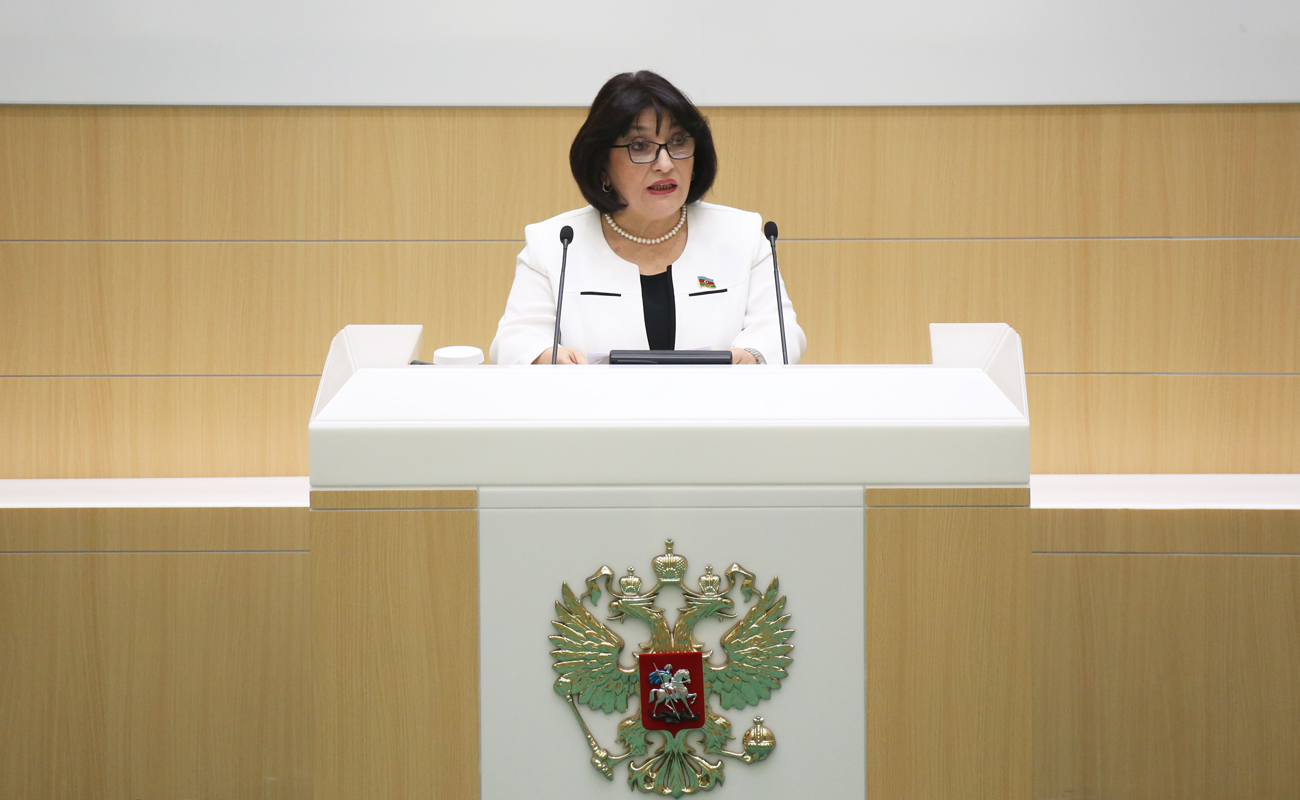The Speech of Chair of the Milli Majlis Sahiba Gafarova at the Federation Council of the Russian Federal Assembly

Chair of the Milli Majlis Sahiba Gafarova who is in Russia on an official visit currently delivered a speech at the Federation Council of the Federation Assembly of the Russian Federation on 23 September.
Incidentally, that was the first ever speech by a speaker of the parliament of Azerbaijan as an independent state to be heard at the Federal Assembly of Russia.
Mrs Gafarova thanked Chair of the Federation Council Valentina Matviyenko for the invitation to visit Russia and mentioned both the historical roots of the Azerbaijani-Russian relations as well as the National Leader Heydar Aliyev having always attached a great importance to promoting comprehensive connections with Russia. As for the present, the friendship and mutual trust between the presidents Ilham Aliyev and Vladimir Putin created a powerful momentum behind the progressing bilateral co-operation.
Azerbaijan and Russia are bound together with the stable and good neighbourly relations. Our countries have signed more than two hundred interstate, intergovernmental and inter-ministerial documents encompassing the most diverse areas of interest such as, to name but a few, trade, economic and social matters, humanitarian affairs and military engineering. The documents provide a robust legal foundation for those areas and for interaction in them. It should be mentioned also that Russia happens to be the main trade partner of Azerbaijan.
Co-operation between the provinces of the two countries is expanding with each passing day. Speaking of Russia’s federal subjects with which Azerbaijan has lively interaction afoot, one could mention Dagestan, Tatarstan, Astrakhan, Saratov, Sverdlovsk, Ulyanovsk, Yekaterinburg, Vladimir and Volgograd.
The efficient bilateral bonds in the humanitarian field are very much of note and bring satisfaction. The Baku International Humanitarian Forums initiated at the suggestion of the two states’ leaders have become over the past few years one of the biggest connectors in this area.
The Russian language and culture have always been taken care of in our country, Mrs Gafarova continued. Azerbaijan has the Baku Slavonic University; besides, both the Lomonosov Moscow State University and the Sechenov First Moscow State Medical University have their respective branches active in our country. Tuition is administered in Russian at more than 300 secondary schools while most of the local universities have the Russian-language education sections. The Samad Vurgun Russian Drama Theatre in Baku has been active for a hundred years now since its inauguration in 1920.
Different ethnic groups and adepts of various religions live as one family in Azerbaijan and that the country is multi-ethnic and multiconfessional is evident from the free service at the mosques, Orthodox and Catholic churches and synagogues around it. The Russian community of Azerbaijan numbering over 120,000 people and being the largest in the South Caucasus is led by Mikhail Zabelin, a member of the Milli Majlis of the sixth convocation. President Ilham Aliyev of Azerbaijan praised their input in one of his speeches, saying, ‘The Russian community of Azerbaijan have preserved their national and religious customs, specific ethnic features, language and culture. It is impossible to imagine the multinational Azerbaijani society without the Russian citizens today.’
The Heydar Aliyev Foundation led by Azerbaijan’s First Vice President, the UNESCO and ICESCO Goodwill Ambassador Mrs Mehriban Aliyeva has a special part to play in the fruitful humanitarian connections amongst our countries, according to Mrs Gafarova.
On another note, Madame Chair emphasised that both parliaments were prominent actors in the Azerbaijani-Russian co-operation as well; they kept up and drove its continued progress. The current ties between the legislative bodies of our countries rest on the Co-operation Agreement between the Milli Majlis of the Azerbaijan Republic and the Federal Assembly of the Russian Federation subject to which the Permanent Interparliamentary Commission for the Co-operation between the FA of the Russian Federation and the Milli Majlis of our country was established. The traditional mutual visits of both parliaments’ speakers and the on-going work done by the two friendship groups are making a special contribution to the cause of continued intensification of the interstate co-operation.
MPs of each country collaborate actively and exercise mutual support in the influential international organisations.
Here, Mrs Gafarova reminded her audience that the Azerbaijani delegation unanimously voted against the resolution about depriving Russia of the vote in the PACE when the draft was put on vote and was one of the few national delegations to oppose it.
Our countries are communal historically as well – only would only have to remember the great Victory over the Nazism the 75th anniversary of which was celebrated earlier this year.
Although the Fascist ideology was eradicated well and proper at the time, certain countries have still been found attempting to rewrite history and lionise Nazi minions over the few years past. Monuments to such persons were erected to the understandable international indignation and reproach. Russia did not sit on the fence, either, but made its stance be known regarding those, no exaggeration meant, disgraceful encroachments. Russia went on to have the countering of glorification of the Nazism discussed at the UN about and a relevant UN resolution passed subsequently.
And yet, Mrs Gafarova stressed, we can see that some states, such as the Republic of Armenia, for instance, are slighting the decisions made by the United Nations Organisation and the other important international institutions. Because, otherwise, what are we supposed to think of the installation in the centre of Yerevan of a six-metre-tall statute of Garegin Nzhdeh, a supporter of Hitler and an abettor of the Fascism? After all, was it not he who said, ‘Who dies for Germany also dies for Armenia’? We consider that such acts on Armenia’s part should not go unnoticed but that an adequate reaction to them is required, Mrs Gafarova insisted.
Then, Madame Chair turned to the issue most painful to us, that is, the conflict between Armenia and Azerbaijan over Highland Garabagh that had resulted in the occupation of 20 per cent of the territory of Azerbaijan – the Highland Garabagh region proper and seven more provinces around it.
As a brief recap of the history of Highland Garabagh, Madame Speaker mentioned the signing of a treaty in the village of Kurakchay near Ganja on 14 May 1805 whereby the Garabagh Khanate was to come under the Russian rule. That treaty was signed by Garabagh’s Ibrahim Khalil Khan and the Russian Empire’s General Pavel Tsitsianov. Other Azerbaijani territories were joined to the Russian Empire under the Gulistan Treaty of 1813 and the Turkmanchay Treaty of 1828. The Azerbaijan Democratic Republic was established in 1918 following the demise of the Russian Empire; the ADR had existed for two years only as the Soviet Rule was incepted in Azerbaijan in 1920. A year later – in 1921 – the Caucasus Bureau of the Bolshevik Party decided on Highland Garabagh remaining in the composition of Azerbaijan. Notably, that resolution was about ‘remaining’ and not ‘transferring’ as the deceitful Armenian sources maintain unfoundedly. Then, in 1923, it was decided to form the Nagorno Karabakh Autonomous Province within the national territory of the Azerbaijan Soviet Socialist Republic. The standards of living in that province were higher than in the other parts of the country; nobody was ever discriminated against on ethnic or religious grounds there.
Unfortunately, Mrs Gafarova remarked, Armenia had never desisted from the attempts to usurp Highland Garabagh; yet another attempt was made in the 1980s when hundreds of thousands of Azerbaijanis who had lived in their historical land for centuries were evicted from Armenia whilst 700,000 Azerbaijanis of Highland Garabagh and the seven equally Azerbaijani provinces around it were deprived of their land and homes. The ethnic cleansing resulted in the numerous civilian casualties; the demographic situation in the captured territories was then modified in the most illegal fashion and contrary to the international humanitarian laws.
Not only has Armenia been ignored and is ignoring now the four resolutions of the UN Security Council of 1993, arguably of the highest international status possible, demanding immediate and unconditional withdrawal of the Armenian armed units from the captured Azerbaijani territories, but Armenia has also violated the ceasefire arrangements repeatedly.
Drawing the attention of her audience to the latest Armenian provocation, Mrs Gafarova emphasised that it had been committed not in Garabagh but on the state border between Armenia and Azerbaijan. Namely, the populated localities in Azerbaijan’s Tovuz Province were subjected by artillery fire with the resulting loss of life and casualties amongst the Azerbaijani military personnel and civilians on 12 July 2020. That was a brazen travesty of the international humanitarian laws put together including the Geneva Convention of 12 August 1949 and the addenda Protocols to it adopted on 8 June 1977. That was a war crime, too, and is noted down as such. The illegal resettlement of Syrian and Lebanese refugees by Armenia to the captured provinces of Azerbaijan in defiance of the mentioned international conventions is the biggest cause of concern.
Madame Chair underscored Azerbaijan’s commitment to having the conflict resolved peacefully, at a negotiating table. The Azerbaijani side consider that the conflict must be settled with adherence to the principle of inviolability of national territories and recognised national borders as well as in conformity with the standards and principles of the international laws. Besides, Azerbaijan believes that the Azerbaijani populace evicted from the areas of their permanent abode must be returned to the region in question and that their everyday life and security must be ensured before whatever status Highland Garabagh might eventually have can be decided. It is only then that one could talk of granting a status of any fashion. The Azerbaijani side are ready to take the steps from which both communities of this region would benefit.
‘You do understand, don’t you, that the continued occupation of our territories is what impedes the achievement of this stage. Incidentally, the leader of the Azerbaijani Community of Highland Garabagh Tural Ganjaliyev is here with us today as a member of the delegation present here now,’ Mrs Gafarova said.
Unfortunately, all the efforts of the Azerbaijani side to achieve a peaceful solution to this problem are in vain because they are shattered by the counterproductive stance of the Armenian Administration who prefer provocations and warlike rhetoric.
Going further, Madame Chair pointed out that Azerbaijan had never laid claims to others’ lands but, on the other hand, the people of Azerbaijan would never let another Armenian state sprout from the historically Azerbaijani lands.
It goes without saying that Russia plays a role of its own in not only regional but also international matters. So, Azerbaijan hopes that Russia, a peaceful conflict solution champion from the very beginning, will use its weight in the international arena and will do all within its powers to put an end to this antagonism that has lasted for long years.
Concluding her speech, Chair of the Milli Majlis Sahiba Gafarova said with confidence that the friendship and mutually beneficial co-operation between Azerbaijan and Russia will continue getting stronger and progressing so that our countries can thrive and our nations can live in prosperity.
The Press and Public Relations Department
The Milli Majlis






